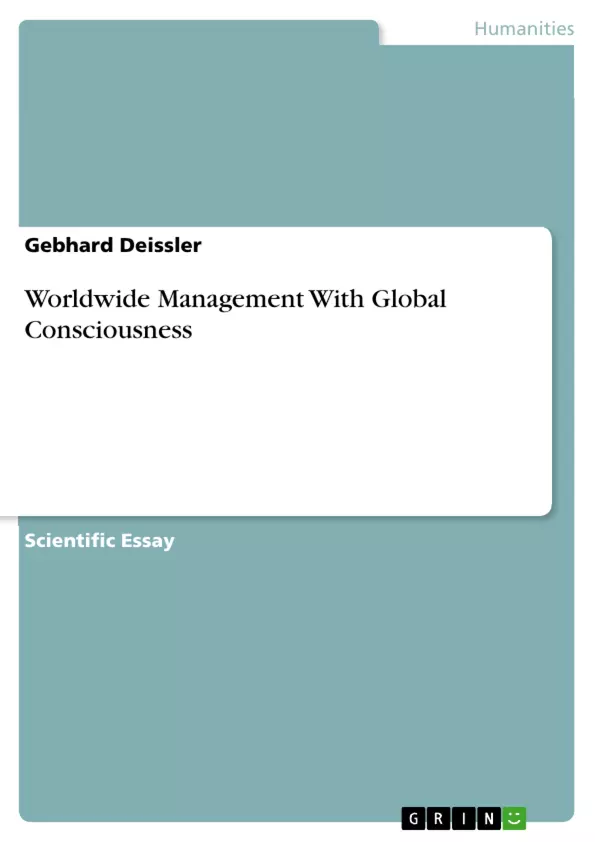The term global is derived from the Latin word globus meaning ball which refers to the ball of the earth, the planet earth or what has become known as the blue planet by virtue of its marvelous blue appearance as seen by the astronauts from space.
Consciousness is another Latin term which, according to language specialists, entered Western languages toward the end of the 12th century. Its Latin root word is conscientia which has the meaning of knowledge.
Table of Contents
- Worldwide Management with Global Consciousness
- Metanational Companies in the Knowledge Economy
- Forces Promoting and Hindering Geocentrism
Objectives and Key Themes
This text aims to explore the concept of worldwide management within a globally conscious framework, focusing on the role of knowledge and its mobilization in achieving global economic dominance. It examines the characteristics of metanational companies and the forces that either promote or hinder a global, rather than localized, perspective in management.
- The definition and implications of "global consciousness" in management.
- The role of knowledge and its mobilization in achieving global economic success.
- The characteristics of metanational companies in the knowledge economy.
- Forces that drive geocentrism (global orientation) in management.
- Forces that resist geocentrism (global orientation) in management.
Chapter Summaries
Worldwide Management with Global Consciousness: This chapter introduces the core concept of the text: worldwide management with global consciousness. It breaks down the etymology of "global" and "consciousness," tracing their origins to Latin roots emphasizing knowledge and understanding of the Earth. The chapter argues that in the modern "knowledge economy," possessing and effectively utilizing this knowledge is paramount for achieving power, particularly global economic power, illustrating this via the potential for wealth generation through the diversity-creativity-innovation-wealth cycle. The importance of "conscientia" (knowledge) as a primary source of power in the technological age is highlighted.
Metanational Companies in the Knowledge Economy: This section delves into the nature of metanational companies, defining them as entities that derive their competitive advantage not from their home country or national subsidiaries but from a global network of knowledge and capabilities. The chapter uses the definition provided by Bartlett, Ghoshal, and Birkinshaw to emphasize the strategic importance of sensing and mobilizing specialist knowledge dispersed across the globe as a pathway to global economic dominance. This section directly connects the earlier discussion of knowledge as power to a specific model of global corporate strategy.
Forces Promoting and Hindering Geocentrism: This chapter explores the factors influencing a company's global orientation (geocentrism). It presents arguments from economics professor Howard Perlmutter, outlining factors that promote geocentrism, such as readily available global skills, international customers, and the need to address low morale in ethnocentric subsidiaries, and factors that hinder it, such as economic nationalism. This provides a balanced perspective, showcasing the challenges and opportunities inherent in pursuing a globally conscious management strategy.
Keywords
Global consciousness, worldwide management, knowledge economy, metanational companies, geocentrism, global economic power, knowledge mobilization, diversity-creativity-innovation-wealth cycle, economic nationalism.
Frequently Asked Questions: Worldwide Management with Global Consciousness
What is the main topic of this text?
The text explores the concept of worldwide management within a globally conscious framework, focusing on the role of knowledge and its mobilization in achieving global economic dominance. It examines metanational companies and the forces promoting and hindering a global management perspective.
What are the key themes discussed?
Key themes include the definition and implications of "global consciousness" in management; the role of knowledge and its mobilization for global economic success; the characteristics of metanational companies in the knowledge economy; forces driving and resisting a global orientation (geocentrism) in management.
What is "global consciousness" in the context of this text?
Global consciousness, in this context, refers to a deep understanding and awareness of global interconnectedness, emphasizing the importance of knowledge and its strategic utilization for achieving global economic power. It traces the roots of "global" and "consciousness" to Latin origins, emphasizing knowledge and understanding of the Earth. The text highlights "conscientia" (knowledge) as a primary source of power in the technological age.
What are metanational companies, and what is their role?
Metanational companies are defined as entities gaining competitive advantage not from their home country or national subsidiaries, but from a global network of knowledge and capabilities. They leverage globally dispersed specialist knowledge for global economic dominance, as emphasized by Bartlett, Ghoshal, and Birkinshaw. This directly connects the concept of knowledge as power to a specific model of global corporate strategy.
What forces promote and hinder geocentrism (global orientation)?
Factors promoting geocentrism include readily available global skills, international customers, and the need to address low morale in ethnocentric subsidiaries. Conversely, factors hindering geocentrism include economic nationalism. The text provides a balanced perspective on the challenges and opportunities inherent in pursuing a globally conscious management strategy.
What is the "diversity-creativity-innovation-wealth cycle"?
The diversity-creativity-innovation-wealth cycle is presented as a mechanism illustrating how the effective utilization of knowledge, particularly through diverse perspectives, can lead to creativity, innovation, and ultimately, wealth generation on a global scale.
What are the key takeaways from the chapter summaries?
The chapter summaries highlight the interconnectedness of global consciousness, knowledge mobilization, the characteristics of metanational companies, and the forces influencing a company's global orientation. Each chapter builds upon the previous one to offer a comprehensive understanding of worldwide management in a globally connected world.
What are the keywords associated with this text?
Key words include: Global consciousness, worldwide management, knowledge economy, metanational companies, geocentrism, global economic power, knowledge mobilization, diversity-creativity-innovation-wealth cycle, economic nationalism.
What is the overall objective of the text?
The text aims to provide a comprehensive overview of worldwide management within a globally conscious framework, emphasizing the role of knowledge, metanational companies, and the forces shaping global business strategies.
- Citar trabajo
- D.E.A./UNIV. PARIS I Gebhard Deissler (Autor), 2010, Worldwide Management With Global Consciousness, Múnich, GRIN Verlag, https://www.grin.com/document/159047



